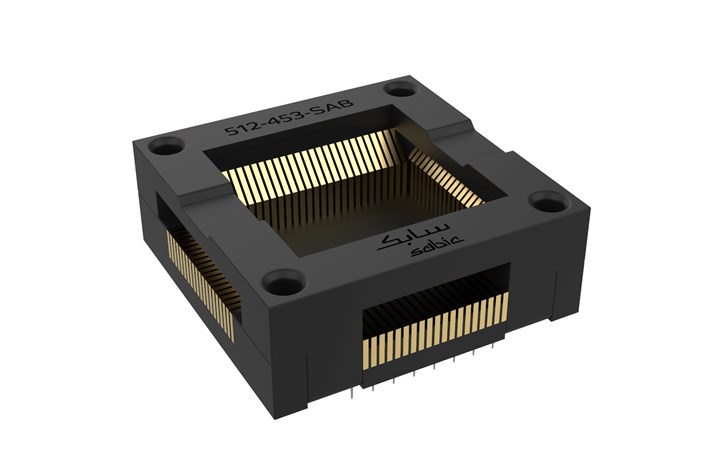LCP-Based Compound for Complex DDR Memory IC Test Socket Systems
SABIC’s LNP Konduit 8TF36E boasts exception thermal conductivity and electrical insulation for burn-in test sockets (BiTS)

A compound based on LCP (liquid crystal polymer) newly launched by SABIC boasts exceptional thermal conductivity and electrical insulation properties. LNP Konduit 8TF36E compound is designed to address the stringent demands of burn-in test sockets (BiTS) used to stress-test double-data-rate (DDR) memory integrated circuits (ICs). The new compound is well suited for fixed, structural parts, including latches and adaptors, in BiTS assemblies.
As the number of pins and the testing temperature for DDR ICs increase and their dimensions shrink, materials used in BiTS components must deliver enhanced properties. Compared to incumbent materials such as thermally conductive filled nylon. SABIC’s new compound is said to provide higher high flow to help enable complex, miniaturized BiTS designs; excellent dimensional stability and high temperature resistance to enhance BiTS functionality during testing; and high thermal conductivity to rapidly dissipate heat afterwards.
During the testing process, this compound has been shown to easily withstand typical testing temperatures of 302 F while maintaining good dimensional stability to help improve the accuracy of measurements. This high heat capability can potentially permit BiTS to be re-used repeatedly without degrading. Further, LNP KONDUIT 8TF36E compound can handle extreme temperatures up to 500 F, building in capability to address higher-heat BiTS requirements in the future. Finally, to quickly dissipate heat after testing, the new product provides high thermal conductivity of up to 4.5W/m.k.
Related Content
-
Prices of All Five Commodity Plastics On the Way Up
Despite earlier anticipated rollover in prices for most of the volume commodity resins, prices were generally on the way up for all going into the third month of first quarter.
-
Part 3: The World of Molding Thermosets
Thermosets were the prevalent material in the early history of plastics, but were soon overtaken by thermoplastics in injection molding applications.
-
Prices Up for All Volume Resins
First quarter was ending up with upward pricing, primarily due to higher feedstock costs and not supply/demand fundamentals.



